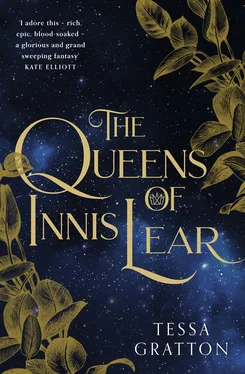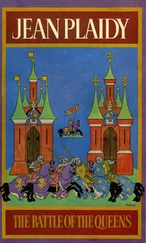No men or women remained, and so Ban dashed across the narrow strip of open land, using the speed to launch himself up the trunk of the chestnut. He caught the lowest branch with a grunt, swung up, and climbed high. The tree was sturdy enough that it never shivered with his weight, merely chuckled at his tickling grip.
Three small birds burst away from his intrusion, and the chestnut warned him to mind the eastern circle of limbs, where he’d already angered some brown squirrels.
Ban climbed along the ladder of boughs, up and out, toward the highest northwestern branch. There, a line of charred lightning strike allowed him a perch with a view of the valley for miles ahead of him, and of the rolling green forest canopy behind. He pushed aside long, serrated leaves and gripped a branch at his shoulder, only as wide as his wrist, to steady himself.
Ban stood, balanced carefully.
Wind caught his hair, pulling it out of his face. He asked the tree to warn him if anything approached, animal or person, then opened his mouth to taste the flavors of the air.
Smoke, old death, and the dusty musk of crows.
Ban lifted onto his toes to reach into the air. He caught a feather, black and smooth. In the inky color he saw shifting waves of men and horses; he saw a cliffside and clouds of reddish smoke, sparkling rocks, rotten flowers, and an empty white hand.
He slid the edge of the feather along his tongue, spat onto the back of his hand, and rubbed it against the chestnut bark hard enough to score the skin bloody. The language of birds was full of dreams, and impossible for men to interpret, it was said. But Ban had learned otherwise, these six years in Aremoria, at least if he could use pain, or blood, to facilitate the translation.
His hand throbbed now, and Ban closed his eyes to recall the pulse of the tranquil spring water. Slowing his breath, he brought his heart into alignment with the forest heart, through this focus of tender skin.
The crow’s many images became one: an army dressed in maroon limped far from here, a full day and night’s ride, backs to him and Aremoria, facing the north cliffs of Burgun.
Thank you, Ban said in the language of trees, and tucked the feather into the crook of leaves where it became a gift for the chestnut. He offered to trim the dead branch, but the chestnut was pleased with its storm-gifted scar. Ban rather liked his own scars, too, for how they proved his experiences and belonged to none but him, and he told the tree as much as he returned to the ground.
Ban landed in a crouch, cold suddenly in the shade. The sun sank over the far mountains bordering the edge of Burgun lands, and Ban wished his clothes were nearer. He’d return to camp, report to Morimaros, and then eat, drink, sleep the short summer night away, not once looking up at the glinting stars.
The evening forest whistled and hummed. The trees observed the usual yawning transition to twilight: they watched animals wake for the hunt, wondered if the king of deer would drive off a lone wolf trapped here, apart from her pack, by the armies, or if that most gentle rabbit would neglect to avoid the oak full of owls. Hungry himself, Ban considered joining the fray, stalking that wolf to try his own hand at her. He smelled like the mud of the forest now, and just a slight trail of his dried blood. It would keep their advantages even.
But if he did not return to camp before darkness set in full, the king would worry, though Ban had tried for years to teach him that there was no need to be concerned with the Fox’s safety in a forest.
It made his lips curl in a small, involuntary smile to think on: a man as good and bold as Morimaros of Aremoria concerned for a bastard like Ban.
So distracted was Ban, it took a scream from three young linden trees to alert him to the man who had invaded the heart spring grove.
Immediately alert, Ban crouched low to make his way around from the south, where the canopy was thickest and more shadows would hide him. Listening to the gentle prodding of trees, Ban crawled along, only his eyes gleaming.
At the edge of the grove, he lowered himself onto his stomach and slipped under a rose vine, enjoying the delicate perfume even as the hooked thorns brushed the dry mud on his shoulders.
Seated on the very root where Ban had left his belongings was none other than King Morimaros. A midsize, handsome man with short, practical dark hair and a matching beard, in the regular uniform of the army except for the long orange leather coat and the royal ring on his forefinger. Ban looked about everywhere, confirming with the trees that Morimaros was alone. Casually reading a letter.
Exasperation and a shot of fear made Ban grit his teeth and creep backward. He’d show Morimaros how stupid it was to be alone, even with the war over, even with Burgun fled.
He climbed up an oak, whispering a request that the tree hold still, and then the next, too, as he stepped across to it, so that they would not shake their leaves and reveal to the king his location. Thus, Ban walked gently from tree to tree, like an earth saint, and sank finally into the embrace of the oak under which Morimaros sat. Ban climbed down, and even when the king looked suddenly out at a cracked branch in the west, Ban was invisible to him, directly above.
In one swift motion, Ban dropped onto the king’s back, threw an arm around his neck, and pulled. But Morimaros grasped his arm and bent, flinging Ban heels over head, hard onto the muddy shore of the spring. Ban rolled onto his hands and the balls of his feet, and glared at the king, eyes and teeth bright in his muddy, wild face.
Morimaros had his sword free, knees bent, ready to defend himself again. “Ban?” he said after a slow moment.
Ban stood. “You were very vulnerable, Your Majesty.”
“Not so, it seems.” The king smiled. He sheathed his sword and picked up the fallen letter.
“Why come out alone? I was on my way to returning.” Ban crossed his arms over his bare chest, suddenly too aware he was naked but for mud-scrawled magic.
“I’m not allowed much solitude, and this evening is perfect for it,” Morimaros said. He ran a hand over his close-cropped hair, a sign of slight embarrassment. “And I would speak with you privately on a certain matter, ah, pertaining to this letter.” He brandished it, and Ban could see the deep blue wax of Lear still clinging to one edge.
All his skin went cold with dread, but Ban nodded because he had to: this was his king, his commander, no matter what else they might be to each other.
The Fox strode into the water and ducked down fully into it, allowing his entire body to be enveloped. It was not peace and cool calm he felt as the water brushed away mud, tickled his spine and the backs of his knees. No, it was a roar of suppressed memories: clenched fists and dismissive words; sheer peaks, crashing waves, and a howling, powerful wind; haunting sweet laughter and black eyes with short, curled lashes; tiny iridescent beetles.
Ban, the bastard of Errigal, scrubbed his skin clean and turned over in the spring, spinning once, twice, and a third time. Rising, he wiped his face, spat water, shook his head like a dog.
When he emerged, he desperately thought of his Aremore name, the one he’d earned, trying to will himself back to center.
The Fox. Ban the Fox.
His eyes opened to see that Morimaros offered him trousers. Ban muttered thanks and dragged them on, tied the waist up and used the plain wool shirt to wipe drips of water from his face and neck, chest and arms.
“Now,” Morimaros said, clasping his shoulder, “I have wine in the crook of that root. Read this letter.”
Ban followed the king, reminding himself he was trusted here, he was honored by the grand crown of Aremoria. Whatever Lear wanted, Ban would attack it from Morimaros’s side. Together, the men sat.
Читать дальше












